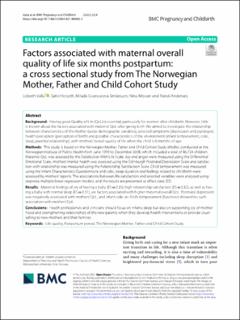| dc.contributor.author | Valla, Lisbeth | |
| dc.contributor.author | Helseth, Sølvi | |
| dc.contributor.author | Småstuen, Milada C | |
| dc.contributor.author | Misvær, Nina | |
| dc.contributor.author | Andenæs, Randi | |
| dc.date.accessioned | 2022-03-10T12:38:52Z | |
| dc.date.available | 2022-03-10T12:38:52Z | |
| dc.date.created | 2022-01-07T13:42:15Z | |
| dc.date.issued | 2022-01-03 | |
| dc.identifier.issn | 1471-2393 | |
| dc.identifier.uri | https://hdl.handle.net/11250/2984274 | |
| dc.description.abstract | Background: Having good Quality of Life (QoL) is essential, particularly for women after childbirth. However, little is known about the factors associated with maternal QoL after giving birth. We aimed to investigate the relationship between characteristics of the mother (socio-demographic variables), selected symptoms (depression and joy/anger), health perception (perception of birth) and possible characteristics of the environment (infant temperament, colic, sleep, parental relationship), with mothers’ overall quality of life when the child is 6 months of age.
Methods: This study is based on the Norwegian Mother, Father and Child Cohort Study (MoBa), conducted at the Norwegian Institute of Public Health from June 1999 to December 2008, which included a total of 86,724 children. Maternal QoL was assessed by the Satisfaction With Life Scale. Joy and anger were measured using the Differential Emotional Scale, mothers’ mental health was assessed using the Edinburgh Postnatal Depression Scale and satisfaction with relationship was measured using the Relationship Satisfaction Scale. Child temperament was measured using the Infant Characteristics Questionnaire and colic, sleep duration and feelings related to childbirth were assessed by mothers’ reports. The associations between life satisfaction and selected variables were analysed using stepwise multiple linear regression models, and the results are presented as effect sizes (ES).
Results: Maternal feelings of joy of having a baby (ES = 0.35), high relationship satisfaction (ES = 0.32), as well as having a baby with normal sleep (ES = 0.31), are factors associated with higher maternal overall QoL. Postnatal depression was negatively associated with mothers’ QoL, and infant colic or child’s temperament (fussiness) showed no such association with mothers’ QoL.
Conclusions: Health professionals and clinicians should focus on infants sleep but also on supporting joy of motherhood and strengthening relationships of the new parents when they develop health interventions or provide counselling to new mothers and their families. | en_US |
| dc.description.sponsorship | The Norwegian Mother, Father and Child Cohort Study is supported by the Norwegian Ministry of Health and Care Services and the Ministry of Education and Research, NIH/NIEHS (contract no N01-ES-75558), NIH/NINDS (grant no.1 UO1 NS 047537–01 and grant no.2 UO1 NS 047537–06A1). | en_US |
| dc.language.iso | eng | en_US |
| dc.publisher | BMC | en_US |
| dc.relation.ispartofseries | BMC Pregnancy and Childbirth;22, Article number: 4 (2022) | |
| dc.rights | Navngivelse 4.0 Internasjonal | * |
| dc.rights.uri | http://creativecommons.org/licenses/by/4.0/deed.no | * |
| dc.subject | Life quality | en_US |
| dc.subject | Postpartum period | en_US |
| dc.subject | The Norwegian Mother, Father and Child Cohort Study | en_US |
| dc.subject | Cohort studies | en_US |
| dc.title | Factors associated with maternal overall quality of life six months postpartum: a cross sectional study from The Norwegian Mother, Father and Child Cohort | en_US |
| dc.type | Peer reviewed | en_US |
| dc.type | Journal article | en_US |
| dc.description.version | publishedVersion | en_US |
| dc.rights.holder | © The Author(s) 2021 | en_US |
| dc.source.articlenumber | 4 | en_US |
| cristin.ispublished | true | |
| cristin.fulltext | original | |
| cristin.qualitycode | 1 | |
| dc.identifier.doi | https://doi.org/10.1186/s12884-021-04303-5 | |
| dc.identifier.cristin | 1976581 | |
| dc.source.journal | BMC Pregnancy and Childbirth | en_US |
| dc.source.volume | 22 | en_US |
| dc.source.pagenumber | 1-8 | en_US |

